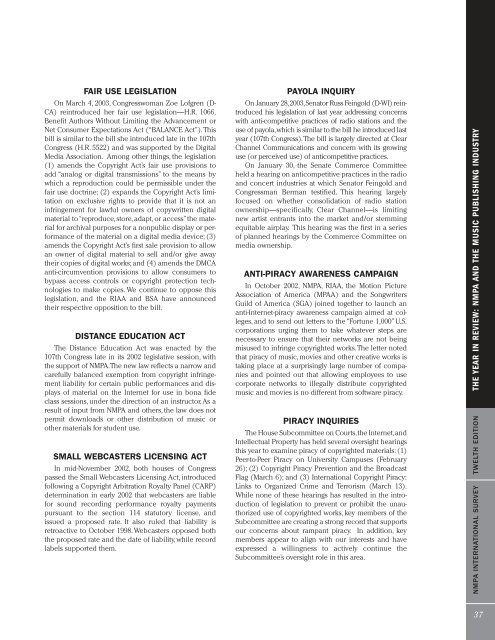NMPA_International_Survey_12th_Edition
NMPA_International_Survey_12th_Edition
NMPA_International_Survey_12th_Edition
You also want an ePaper? Increase the reach of your titles
YUMPU automatically turns print PDFs into web optimized ePapers that Google loves.
FAIR USE LEGISLATION<br />
On March 4, 2003, Congresswoman Zoe Lofgren (D-<br />
CA) reintroduced her fair use legislation—H.R. 1066,<br />
Benefit Authors Without Limiting the Advancement or<br />
Net Consumer Expectations Act (“BALANCE Act”).This<br />
bill is similar to the bill she introduced late in the 107th<br />
Congress (H.R. 5522) and was supported by the Digital<br />
Media Association. Among other things, the legislation<br />
(1) amends the Copyright Act’s fair use provisions to<br />
add “analog or digital transmissions” to the means by<br />
which a reproduction could be permissible under the<br />
fair use doctrine; (2) expands the Copyright Act’s limitation<br />
on exclusive rights to provide that it is not an<br />
infringement for lawful owners of copywritten digital<br />
material to “reproduce, store, adapt, or access”the material<br />
for archival purposes for a nonpublic display or performance<br />
of the material on a digital media device; (3)<br />
amends the Copyright Act’s first sale provision to allow<br />
an owner of digital material to sell and/or give away<br />
their copies of digital works; and (4) amends the DMCA<br />
anti-circumvention provisions to allow consumers to<br />
bypass access controls or copyright protection technologies<br />
to make copies. We continue to oppose this<br />
legislation, and the RIAA and BSA have announced<br />
their respective opposition to the bill.<br />
DISTANCE EDUCATION ACT<br />
The Distance Education Act was enacted by the<br />
107th Congress late in its 2002 legislative session, with<br />
the support of <strong>NMPA</strong>.The new law reflects a narrow and<br />
carefully balanced exemption from copyright infringement<br />
liability for certain public performances and displays<br />
of material on the Internet for use in bona fide<br />
class sessions, under the direction of an instructor.As a<br />
result of input from <strong>NMPA</strong> and others, the law does not<br />
permit downloads or other distribution of music or<br />
other materials for student use.<br />
SMALL WEBCASTERS LICENSING ACT<br />
In mid-November 2002, both houses of Congress<br />
passed the Small Webcasters Licensing Act, introduced<br />
following a Copyright Arbitration Royalty Panel (CARP)<br />
determination in early 2002 that webcasters are liable<br />
for sound recording performance royalty payments<br />
pursuant to the section 114 statutory license, and<br />
issued a proposed rate. It also ruled that liability is<br />
retroactive to October 1998. Webcasters opposed both<br />
the proposed rate and the date of liability, while record<br />
labels supported them.<br />
PAYOLA INQUIRY<br />
On January 28,2003,Senator Russ Feingold (D-WI) reintroduced<br />
his legislation of last year addressing concerns<br />
with anti-competitive practices of radio stations and the<br />
use of payola,which is similar to the bill he introduced last<br />
year (107th Congress).The bill is largely directed at Clear<br />
Channel Communications and concern with its growing<br />
use (or perceived use) of anticompetitive practices.<br />
On January 30, the Senate Commerce Committee<br />
held a hearing on anticompetitive practices in the radio<br />
and concert industries at which Senator Feingold and<br />
Congressman Berman testified. This hearing largely<br />
focused on whether consolidation of radio station<br />
ownership—specifically, Clear Channel—is limiting<br />
new artist entrants into the market and/or stemming<br />
equitable airplay. This hearing was the first in a series<br />
of planned hearings by the Commerce Committee on<br />
media ownership.<br />
ANTI-PIRACY AWARENESS CAMPAIGN<br />
In October 2002, <strong>NMPA</strong>, RIAA, the Motion Picture<br />
Association of America (MPAA) and the Songwriters<br />
Guild of America (SGA) joined together to launch an<br />
anti-Internet-piracy awareness campaign aimed at colleges,<br />
and to send out letters to the “Fortune 1,000” U.S.<br />
corporations urging them to take whatever steps are<br />
necessary to ensure that their networks are not being<br />
misused to infringe copyrighted works.The letter noted<br />
that piracy of music, movies and other creative works is<br />
taking place at a surprisingly large number of companies<br />
and pointed out that allowing employees to use<br />
corporate networks to illegally distribute copyrighted<br />
music and movies is no different from software piracy.<br />
PIRACY INQUIRIES<br />
The House Subcommittee on Courts,the Internet,and<br />
Intellectual Property has held several oversight hearings<br />
this year to examine piracy of copyrighted materials: (1)<br />
Peer-to-Peer Piracy on University Campuses (February<br />
26); (2) Copyright Piracy Prevention and the Broadcast<br />
Flag (March 6); and (3) <strong>International</strong> Copyright Piracy:<br />
Links to Organized Crime and Terrorism (March 13).<br />
While none of these hearings has resulted in the introduction<br />
of legislation to prevent or prohibit the unauthorized<br />
use of copyrighted works, key members of the<br />
Subcommittee are creating a strong record that supports<br />
our concerns about rampant piracy. In addition, key<br />
members appear to align with our interests and have<br />
expressed a willingness to actively continue the<br />
Subcommittee’s oversight role in this area.<br />
<strong>NMPA</strong> INTERNATIONAL SURVEY TWELTH EDITION THE YEAR IN REVIEW: <strong>NMPA</strong> AND THE MUSIC PUBLISHING INDUSTRY<br />
37


